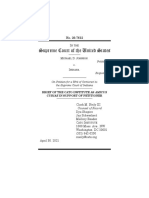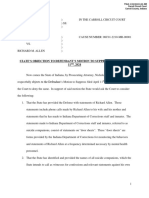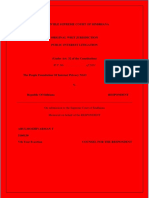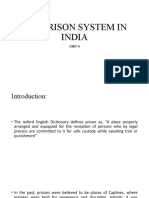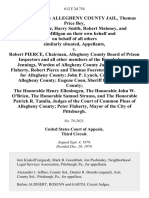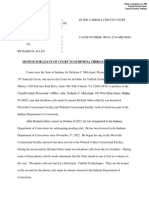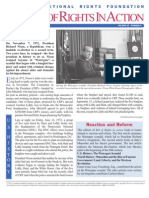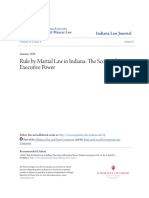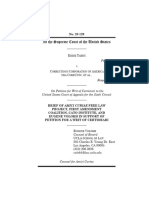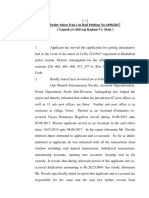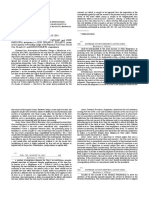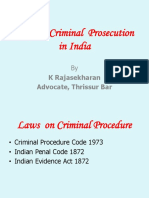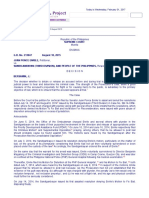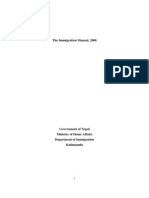WALTER WHITE VS.
REPUBLIC OF INDIANA
The Republic of Indiana, a vibrant and diverse nation, sprawls across a vast
subcontinent with diverse culture, religion, language and history. Indiana
comprises 28 States and 8 Union Territories with a total population of over 1.2
billion people. Indiana is a democracy governed by the Rule of Law and boasts of
having the longest written Constitution in the world.
Majority of Indiana’s population is poor. However, for the first time in its history,
over 60% of Indiana’s population is below the age of 35. Seeing this as a unique
opportunity to eradicate poverty and uplift the quality of life of its citizens, the
elected national government in Indiana is focusing heavily on massive skill
upgradation of its young population. However, due to the widespread use of drugs
and narcotic substances by the youth in several parts of the country, achieving this
goal has become a real challenge.
Indiana, therefore, has a very strict policy against drugs under the Narcotics and
Psychotropic Substances Act, 1999 which makes it illegal to produce, manufacture,
cultivate, possess, sell, purchase, transport, store, or consume narcotics drugs or
psychotropic substances. The Narcotics Control Squad (NCS) is Indiana’s premier
central law enforcement and intelligence agency tasked with combating drug
trafficking and the use of illegal narcotics and psychotropic substances.
In March 2023, as part of its campaign to create a drug free society, NCS
conducted raids at several locations across the country. During one of these raids,
in a major crackdown, the NCS arrested “Walter White”, an Indian citizen, who is
also known as the “Lord of Drugs” internationally. The arrest of Walter White, the
�Kingpin of Indiana’s drug syndicate, was a huge win for the NCS as well as
Indiana’s elected government.
The chargesheet filed by the prosecution of the State against White alleges that
he used to head the drug syndicate across Indiana. He was instrumental in funding
several terrorist organizations and also promoted narco-terrorism thereby causing
serious risk to Indiana’s national/internal security.
Walter White was arrested and lodged in the maximum-security prison complex,
Trihar Jail, in Indiana’s capital city of Dille. As a prisoner lodged in Trihar Jail, White
noticed that Artificial Intelligence (AI)-powered CCTV cameras were installed
across the prison complex. Furthermore, he even noticed that the CCTV cameras
were also installed inside the cell allotted to the inmates. Except the area allotted
for ‘convenience/washroom’, every single corner of the cell was under
surveillance 24x7. He further noticed that there was no spot inside the entire
prison complex which was not monitored by the AI-powered CCTV cameras.
Shocked by this revelation, White addressed a letter petition to the Chief Justice of
Indiana stating that the installation of AI-powered CCTV cameras inside the prison
complex, and specially inside the cells of the inmates, was a violation of their
fundamental right to privacy guaranteed under the Constitution of Indiana. He
argued that prisoners too, have a right to life and liberty and such surveillance
adversely affects their ability to fully enjoy such a right. He further argued that AI-
powered CCTV cameras can also cause serious risk to the security of the prison
complex as the common grid in which the entire recorded data is saved can be
subjected to manipulation and theft. He therefore urged the Chief Justice to
�register a PIL on his behalf challenging the constitutionality of this executive
action.
The Chief Justice of Indiana took cognizance of White’s letter petition and,
acknowledging the seriousness of the issues raised, decided to convert the same
into a PIL. Subsequently, White, through his lawyer, applied for bail before the
High Court of Dille. The High Court was pleased to grant him bail, however, with
the condition that he shall switch on his google location and share his live location
with the SHO of the local police station at all times while on bail. White filed a
Special Appeal against the order of the High Court. He argued that imposing a
condition of such a nature amounts to a violation of his right to privacy.
The PIL as well as White’s Special Appeal have now been clubbed together and
listed for final hearing before a Constitution Bench of 5 judges of the Supreme
Court of Indiana.
ISSUES
A. Whether installing AI-powered CCTV cameras/CCTV cameras inside the prison
complex, including the cells of inmates, is a violation of their right to privacy?
B. Whether the imposition of the condition that Walter White will share his live
location with the SHO of the local police station at all times while being on bail is a
violation of his Right to Privacy?



















